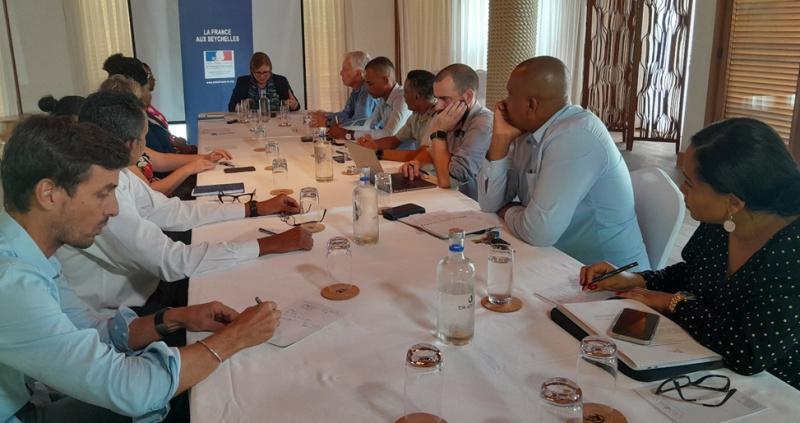Africa-Press – Seychelles. In the context of the preparation of the Third United Nations Conference on the Ocean (UNOC 3) which will take place in Nice, France on June 9 and 10, 2025, a first “BlueTalks/Blue Clubs” meeting was organized beforehand by the French Embassy in Seychelles with local partners at l’Escale Resort. This conference will be organized in collaboration with Costa Rica.
About twenty people were gathered from various governmental and private organizations to highlight the challenges that Seychelles faces.
The Ambassador of France to Seychelles, Olivia Berkeley-Christmann explained the context of this conference which is to follow up on the important advances of the ‘One Ocean Summit’ (Brest, 9-11 February 2022).
“It is the President of the French Republic, Emmanuel Macron, who wished that our country (France), a major global maritime actor, welcomes a new major political meeting to strengthen the protection of the ocean, which we know that It is at the heart of the “climatic ebullition” on a planetary scale. France aims for an international mobilization for the protection of the ocean similar to that for the climate, ten years after the COP21 and the Paris Agreement. This mobilization will be necessary at the same time to take into account the urgency, the strengthening of scientific knowledge, progress in the ongoing negotiations and the commitment of all the actors concerned, including economic and financial”.
France and Costa Rica will host the third edition of the United Nations Oceans Conference (CNOC), in accordance with the resolution unanimously adopted by the United Nations General Assembly (AGNU) on December 20, 2022. This conference will be held from June 9 to 14, 2025 in Nice, with a prologue from June 5 to 8, 2025. A high-level thematic preliminary event will be held in Costa Rica on June 7 and 8, 2024.
France and Costa Rica wish to raise the level of ambition compared to the two previous editions of the CNOC, associating the political declaration with an action program composed of voluntary commitments, carried by coalitions, in order to an action-oriented conference. These two elements, as well as the conclusions of the high-level ocean action panels, would together constitute the main written results of the Conference: the Nice Ocean Action Plan, the “NOA Plan” (Nice Ocean Action Plan).
All member states of the United Nations, including those without maritime littorals, will participate in the preparation of the Conference and in the definition of its priorities.
Ambassador Berkeley-Christmann also shared that UNOC 3 will be structured around the following three pillars: (i) plead for the outcome of multilateral processes directly or indirectly linked to the ocean and consolidate, even enhance our common objectives for the protection of the ocean; (ii) mobilize and increase financing, including the development of new financial mechanisms relevant to the realization of ODD 14 and support to the blue economy and (iii) strengthen and better disseminate knowledge related to ocean sciences for a better decision making.
The planned activities
Three major events will be organized in Nice and Monaco before the Conference, between June 5 and 8, 2025:
A three-day “One Ocean Science” conference bringing together nearly 3,000 researchers; a forum dedicated to the blue economy and the financing of ocean protection, organized in collaboration with the Principality of Monaco; a special summit on coastal cities and regions and their resilience to climate change and sea level rise.
“Our authorities are fully committed to protecting the ocean, at the height of the environmental and climate challenge. At the time of the assessment of the 2030 Agenda and its ODD 14, after the COP 15 biodiversity and the outcome of the ‘Biodiversity Beyond National Jurisdiction’ (BBNJ) negotiations, we must go much further and significantly strengthen this protection. The ocean is an indispensable resource for the populations in both respects. According to the UN, more than 3 billion people depend on the ocean and find their means of subsistence”, noted Ambassador Berkeley-Christmann.
The ocean plays an irreplaceable role in regulating climate warming, through its role as a carbon pump. “It is estimated that the ocean contains 50 times more carbon than the atmosphere, and that it would have absorbed 30% of the anthropogenic emissions of carbon dioxide during the last decades. The significant degradation of its state of health and that of this biodiversity will lead to irreparable losses. As stated by the Secretary General of the United Nations during the last United Nations Ocean Conference in Lisbon, the ocean is in a state of emergency. We must commit ourselves collectively à stop
For More News And Analysis About Seychelles Follow Africa-Press






